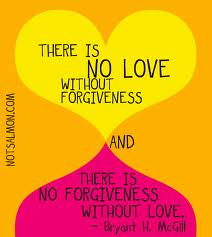Hello!
It might seem like blasphemy but here me out. Although forgiving is a virtue I pursue wholeheartedly, there are some conditions under which it does not work.
Consider these:
Forgiving to get an apology
If you believe something was done to you and the person has not demonstrated any remorse or apologized, you may feel that by telling them you forgive them, they will be prompted to “do the right thing” and be accountable for what they have done by apologizing and thanking you for your forgiveness. If they fail to do as you imagined, more hurt and possibly anger will be added to the dynamics and true forgiveness will become even less likely.
This is not a good reason to forgive and as a result of the lack of sincerity, you will not feel the benefits of forgiveness – no lighter spirit and no less pain about the violation. Instead, come to terms with the lack of remorse or apology and release the person(s) from blame. Then, let some time pass and have a conversation when you are at peace with the lack of apology…if necessary. When their apology is NOT needed (though it is still a good thing – for their own good and for the relationship in general) you will be ready to forgive.
Forgiving to gain power in the relationship or to impress others
Some people feel that by forgiving their loved one or colleague (quite popular on the work front) they are making a statement about their “maturity” or superior professional or spiritual status. (Just putting those words together in one sentence seems bazaar!) I’ve seen people “forgive” so their mate or team member will continue to see/treat them as the better person.
This is particularly popular among the “enlightened” set: The folks who have confused knowledge for wisdom. Knowing and even doing the right thing can’t be confused with Being the right thing – sincere and loving. Gaining power, impressing folks and generally doing things (good) for the wrong reasons will get you nowhere fast with forgiveness. Forgiveness is a love based process and nothing less will get you there.
Forgiving to get approval or to feel lovable
This is sad. A person who does not feel worthy or lovable in a relationship will sometimes let their offender off the hook very easily because they feel that by doing this they keep the love they so desperately need. That is not forgiveness and it surely isn’t love, if that’s how it is “negotiated.”
Forgiving to make peace
At first glance you might be asking “so what’s wrong with that, wanting peace is a good thing isn’t it?” The important thing here is the answer to this question: “Are YOU at peace with the wounded feelings or offense that was felt?” If the desire for peace is connected to any level of fear of the person in question you probably want to forgive prematurely: First deal with the fear then move on to forgiveness.
Also, if you are still in tremendous pain and you have not yet tended to that pain – getting to know the reason, history and source of the original violation that led to that type of offense stinging so much – you may be forgiving to make peace and your heart may not be fully in it.
While it is possible to truly forgive while in pain (and forgiveness will in fact reduce and eliminate the pain eventually) – when things are raw and not yet understood, it takes an enormous amount of self-knowledge and spiritual diligence to get that pain understood and transformed. Forgiveness is a process and emotional honesty is a prerequisite. Likewise, peace can’t be had on the surface; getting it and keeping it requires love, honesty and authentic sharing.
These are four ways to basically fake forgiveness and they never work. True forgiveness is about doing the right thing, at the right time and for the right reason.
Wishing you an abundance of peace, love and joy,
♥~
